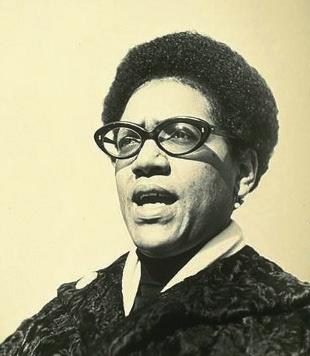STUDENT CONTEST WINNERS
Zoe Tagoe, My Voice
11th Grade, Cardinal Spellman High School
Mariam Dembélé, Hair
11th Grade, Repertory Company
High School for Theatre Arts
Amiyah Anderson, I Was Born In Quicksand
10th Grade, Harlem Village
Academies High School
Gladys Holman, U.S.A.
8th Grade, Hunters Point
Community Middle School
Cameron Dada, Your Little Box
12th Grade, Repertory Company
High School for Theatre Arts
@TownHallNYC | 9
Langston Hughes (1901–1967) Langston Hughes was a central figure in the Harlem Renaissance, the flowering of black intellectual, literary, and artistic life that took place in the 1920s in a number of American cities, particularly Harlem. A major poet, Hughes also wrote novels, short stories, essays, and plays. He sought to honestly portray the joys and hardships of working-class black lives, avoiding both sentimental idealization and negative stereotypes. As he wrote in his essay “The Negro Artist and the Racial Mountain,” “We younger Negro artists who create now intend to express our individual dark-skinned selves without fear or shame. If white people are pleased we are glad. If they are not, it doesn’t matter. We know we are beautiful. And ugly too.”

Source: Poetry Foundation
Maya Angelou (1928-2014) An acclaimed American poet, storyteller, activist, and autobiographer, Maya Angelou was born Marguerite Johnson in St. Louis, Missouri. Angelou had a broad career as a singer, dancer, actress, composer, and Hollywood’s first female black director, but became most famous as a writer, editor, essayist, playwright, and poet. As a civil rights activist, Angelou worked for Dr. Martin Luther King Jr. and Malcolm X. She was also an educator and served as the Reynolds professor of American Studies at Wake Forest University. By 1975, wrote Carol E. Neubauer in Southern Women Writers: The New Generation, Angelou was recognized “as a spokesperson for… all people who are committed to raising the moral standards of living in the United States.” She served on two presidential committees, for Gerald Ford in 1975 and for Jimmy Carter in 1977. In 2000, Angelou was awarded the National Medal of Arts by President Bill Clinton. In 2010, she was awarded the Presidential Medal of Freedom, the highest civilian honor in the U.S., by President Barack Obama. Angelou was awarded over 50 honorary degrees before her death. Source: Poetry Foundation

Amanda Gorman (b. 1998) Amanda Gorman was born and raised in Los Angeles. She is the author of the poetry book The One for Whom Food Is Not Enough (2015). Her art and activism focus on issues of oppression, feminism, race, and marginalization, as well as the African diaspora. In 2014 Gorman was named the first Youth Poet Laureate of Los Angeles, and in 2017 was named the first US National Youth Poet Laureate. Gorman is the founder of a non-profit organization called One Pen One Page, which runs a youth writing and leadership program. In early 2021, she was selected by president elect Joe Biden to read her original poem, “The Hill We Climb” at his inauguration. Source: Poetry Foundation

Nikki Giovanni (b. 1943) Poet Nikki Giovanni was born in Knoxville, Tennessee, on June 7, 1943, and grew up in Cincinnati, Ohio. A world-renowned poet and one of the foremost authors of the Black Arts Movement, her notable books of poetry are Black Judgment (1968) and Those Who Ride the Night Winds (1983), which were influenced by her participation in the Black Arts Movement and Black Power movement in the 1960s
Giovanni has published numerous collections of poetry—from her first self-published volume, Black Feeling Black Talk (1968), to New York Times best seller Bicycles: Love Poems (2009). She has written several works of nonfiction and children’s literature and made

10 | @TownHallNYC 28 POETS FROM HISTORY
multiple recordings, including the Emmy-award nominated The Nikki Giovanni Poetry Collection (2004) Giovanni has received numerous awards, and is a seven-time recipient of the NAACP Image Award. Giovanni’s work explores race, gender, sexuality, and the African American family. Source: Poetry Foundation
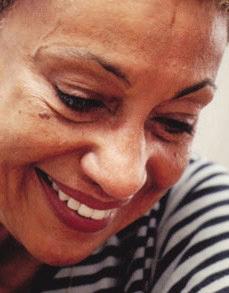
Gwendolyn Brooks (1917-2000) Gwendolyn Brooks is one of the most highly regarded, influential, and widely read poets of 20th-century American poetry. She was a much-honored poet, even in her lifetime, with the distinction of being the first Black author to win the Pulitzer Prize. She also was poetry consultant to the Library of Congress—the first Black woman to hold that position—and poet laureate of the State of Illinois. Many of Brooks’s works display a political consciousness, especially those from the 1960s and later, with several of her poems reflecting the civil rights activism of that period. Her body of work gave her, according to critic George E. Kent, “a unique position in American letters. Not only has she combined a strong commitment to racial identity and equality with a mastery of poetic techniques, but she has also managed to bridge the gap between the academic poets of her generation in the 1940s and the young Black militant writers of the 1960s.”

Source: Poetry Foundation
June Jordan (1936-2002)One of the most widely-published and highly-acclaimed Jamaican American writers of her generation, poet, playwright and essayist June Jordan was known for her fierce commitment to human rights and political activism. Over a career that produced twenty-seven volumes of poems, essays, libretti, and work for children, Jordan engaged the fundamental struggles of her era: for civil rights, women’s rights, and sexual freedom. A prolific writer across genres, Jordan’s poetry is known for its immediacy and accessibility as well as its interest in identity and the representation of personal, lived experience—her poetry is often deeply autobiographical. Jordan’s work also frequently imagines a radical, globalized notion of solidarity amongst the world’s marginalized and oppressed. In volumes like Some Changes (1971), Living Room (1985) and Kissing God Goodbye: Poems 1991-1997 (1997), Jordan uses conversational, often vernacular English to address topics ranging from family, bisexuality, political oppression, racial identity and racial inequality, and memory. Source: Poetry Foundation
Claude McKay (1890-1948) Claude McKay, born Festus Claudius McKay in Sunny Ville, Jamaica in 1889, was a key figure in the Harlem Renaissance, a prominent literary movement of the 1920s. His work ranged from vernacular verse celebrating peasant life in Jamaica to poems that protested racial and economic inequities. His philosophically ambitious fiction, including tales of Black life in both Jamaica and America, addresses instinctual/intellectual duality, which McKay found central to the Black individual’s efforts to cope in a racist society. He is the author of The Passion of Claude McKay: Selected Poetry and Prose (1973), The Dialectic Poetry of Claude McKay (1972), Selected Poems (1953), Harlem Shadows (1922), Constab Ballads (1912), and Songs of Jamaica (1912), among many other books of poetry and prose. Source: Poetry Foundation

@TownHallNYC | 11 28 POETS FROM HISTORY
Sonia Sanchez (b. 1934) Sonia Sanchez was born in 1934 in Birmingham, Alabama. Sanchez is the author of more than 20 books, including Homecoming (1969), We a BaddDDD People (1970), Love Poems (1973), I’ve Been a Woman: New and Selected Poems (1978), A Sound Investment (1980), Homegirls and Handgrenades (1984), Under a Soprano Sky (1987), Wounded in the House of a Friend (1995), Does Your House Have Lions? (1997), Like the Singing Coming off the Drums (1998), Shake Loose My Skin (1999), Morning Haiku (2010), and, most recently, Collected Poems (2021). In addition to being a contributing editor to Black Scholar and The Journal of African Studies, she has edited an anthology, We Be Word Sorcerers: 25 Stories by Black Americans (1973). Source: Poetry Foundation

Mahogany L. Browne (b. 1996) Mahogany L. Browne, selected as Kennedy Center’s Next 50 and Weseleyan’s 2022-23 Distinguished Writer-in-Residence, the Executive Director of JustMedia, Artistic Director of Urban Word, a writer, playwright, organizer, & educator. Browne has received fellowships from Arts for Justice, Air Serenbe, Cave Canem, Poets House, Mellon Research & Rauschenberg. She is the author of recent works: Vinyl Moon, Chlorine Sky, Woke: A Young Poets Call to Justice, Woke Baby, & Black Girl Magic. Founder of the diverse lit initiative Woke Baby Book Fair, Browne’s latest poetry collection Chrome Valley is a promissory note to survival and available from Norton Spring 2023. As she readies for her stage debut of Chlorine Sky at Steppenwolf Theater in Chicago, Illinois, she drinks coffee while living in Brooklyn, NY. She is the first ever poet-in-residence at Lincoln Center. Source: Blue Flower Arts
Staceyann Chin (b. 1972) Performer, writer, and activist Staceyann Chin is the author of the poetry collection Crossfire: A Litany for Survival (2019), winner of the American Book Award, and the memoir The Other Side of Paradise (2009). She received a 2003 Drama Desk Award for her performance in Def Poetry Jam on Broadway, which she cowrote with Russell Simmons. Chin is the author of the one-woman shows MotherStruck! (2015), Border/Clash (2005), Unspeakable Things (2001), and Hands Afire (2000). Her poems have been included in several anthologies, including Bullets & Butterflies: Queer Spoken Word Poetry (2005) and Skyscrapers, Taxis, & Tampons (1999). Chin has also performed in both the stage and film versions of Howard Zinn’s Voices of a People’s History of the United States, at the Nuyorican Poets Cafe, and at numerous universities, including Princeton, Harvard, Yale, and the University of the West Indies. She has appeared widely on television and radio. Source: Poetry Foundation

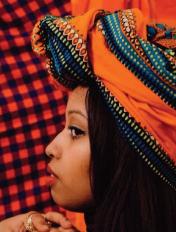
Warsan Shire (b. 1988) Warsan Shire is a Somali British writer and poet born in Nairobi and raised in London. She has written two chapbooks, Teaching My Mother How to Give Birth and Her Blue Body. She was awarded the inaugural Brunel International African Poetry Prize and served as the first Young Poet Laureate of London. She is the youngest member of the Royal Society of Literature and is included in the Penguin Modern Poets series. Shire wrote the poetry for the Peabody Award–winning visual album Lemonade and the Disney film Black Is King in collaboration with Beyoncé Knowles-Carter. She also wrote the short film Brave Girl Rising, highlighting the voices and faces of Somali girls in Africa’s largest refugee camp. Shire lives in Los Angeles with her husband and two children. Bless the Daughter Raised by a Voice in Her Head is her fulllength debut poetry collection. Source: Poetry Foundation

12 | @TownHallNYC
28 POETS FROM HISTORY
Eve Ewing (b. 1986) Eve Ewing is a poet and sociologist of education. She earned a BA from the University of Chicago, an MAT from Dominican University, and an MEd and PhD from the Harvard University Graduate School of Education. Her first collection of poetry, essays, and visual art, Electric Arches, was published by Haymarket Books in fall 2017. Her work has been published in many venues, including Poetry Magazine, the New Yorker, the Atlantic, the Nation, the New Republic, Union Station, and the anthology
The Breakbeat Poets: New American Poetry in the Age of Hip-Hop. She has been a Pushcart Prize nominee, a finalist for the Pamet River Prize, and a scholarship recipient for the New Harmony Writers Workshop. Source: Poetry Foundation

Tracy K. Smith (b. 1972) Tracy K. Smith was born in Massachusetts and raised in northern California. Smith is the author of four books of poetry: The Body’s Question (2003), which won the Cave Canem prize for the best first book by an African-American poet; Duende (2007), winner of the James Laughlin Award and the Essense Literary Award; Life on Mars (2011), winner of the Pulitzer Prize for Poetry; and Wade in the Water (2018). In 2014 she was awarded the Academy of American Poets fellowship. She has also written a memoir, Ordinary Light (2015), which was a finalist for the National Book Award in nonfiction. In June 2017, Smith was named U.S. poet laureate. Source: Poetry Foundation

Gregory Pardlo (b. 1968) Gregory Pardlo was born in Philadelphia and grew up in Willingboro, New Jersey. He is the author of Totem (2007), winner of the APR/Honickman First Book Prize, and Digest (2014), winner of the Pulitzer Prize for Poetry. Pardlo’s poems, reviews, and translations have been widely published and are noted for “language simultaneously urban and highbrow… snapshots of a life that is so specific it becomes universal.”
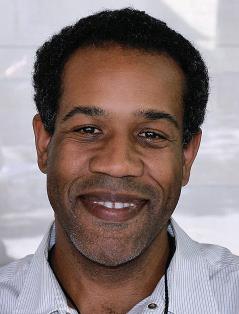
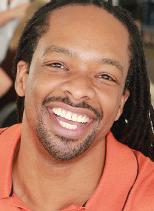
Source: Poetry Foundation
Tyehimba Jess (b. 1965) Born in Detroit, poet Tyehimba Jess earned his BA from the University of Chicago and his MFA from New York University. He is the author of leadbelly (2005) and Olio (2016), winner of the Pulitzer Prize.

Jess is the rare poet who bridges slam and academic poetry. His first collection, leadbelly (2005), an exploration of the blues musician Huddie “Lead Belly” Ledbetter’s life, was chosen for the National Poetry Series by Brigit Pegeen Kelly, and was voted one of the top three poetry books of the year by Black Issues Book Review. Jess’s second book Olio (2016) received the Pulitzer Prize. Source: Poetry Foundation
Jericho Brown (b. 1976) Jericho Brown’s first book, Please (New Issues, 2008), won the American Book Award, and his second book, The New Testament (Copper Canyon, 2014), was named one of the best poetry books of the year by Library Journal and received the Anisfield-Wolf Book Award. His third collection, The Tradition (Copper Canyon, 2019), won the Pulitzer Prize for Poetry and was a finalist for many awards, including the National Book Critics Circle Award. Source: Poetry Foundation
@TownHallNYC | 13
28 POETS FROM HISTORY
Yrsa Daley-Ward (b. 1989) Yrsa Daley-Ward is a poet, a writer and an actor. Born in Lancashire, England, she was raised by her grandparents, who were strict Seventh Day Adventists. Daley-Ward spent years struggling to make ends meet as a creative. Because of lack of opportunities in England, she moved to South Africa to pursue work. While there, she began writing and performing her own poetry. Daley-Ward began posting poems to Instagram and soon gained a following. She self-published her first collection of poetry Bone in 2014. Bone was subsequently republished by Penguin Books with a foreword from Kiese Laymon. Daley-Ward is also the author of the memoir The Terrible: A Storyteller’s Memoir (2018). Source: Poetry Foundation
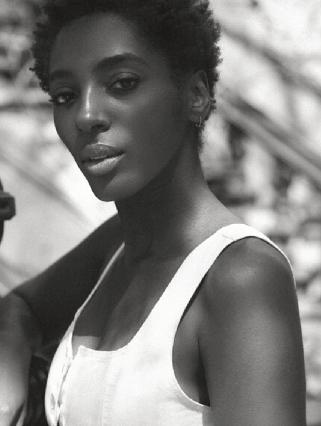
Amiri Baraka (1934-2014) Poet, writer, teacher, and political activist Amiri Baraka was born Everett LeRoi Jones in 1934 in Newark, New Jersey. He attended Rutgers University and Howard University, spent three years in the U.S. Air Force, and returned to New York City to attend Columbia University and the New School for Social Research. Baraka was well known for his strident social criticism, often writing in an incendiary style that made it difficult for some audiences and critics to respond with objectivity to his works. Throughout most of his career his method in poetry, drama, fiction, and essays was confrontational, calculated to shock and awaken audiences to the political concerns of black Americans. For decades, Baraka was one of the most prominent voices in the world of American literature. Source: Poetry Foundation

Jesús Colón (1901-1974) Jesús Colón was born in Cayey, Puerto Rico, after the Spanish-American War, when the American Tobacco Company gained control of most of the tobacco-producing land in Puerto Rico. In 1917, when he was 16, he boarded the S.S. Carolina as an employee and landed in Brooklyn, N.Y. Colón was black, and was discriminated against because of the color of his skin and because of his difficulty speaking the English language . He wrote about his experiences as well as those of other immigrants. He was the first Puerto Rican to do so in English. His best-known work, “A Puerto Rican in New York and Other Sketches,” inspired other writers. Source: https://www.peoplesworld.org/article/jesus-colon-a-puerto-rican-in-new-york/

Ntozake Shange (1948-2018) Ntozake Shange was born Paulette Williams into an upper middle-class African American family. Her father was an Air Force surgeon and her mother a psychiatric social worker. Cultural icons such as Dizzie Gillepsie, Miles Davis, and W.E.B. DuBois were regular guests in the Williams home. Shange attended Barnard College and the University of Southern California, earning both a BA and MA in American Studies. Shange’s college years were difficult, however; frustrated and hurt after separating from her first husband, she attempted suicide several times before focusing her rage against the limitations society imposes on Black women. While earning an MA degree, she reaffirmed her personal strength based on a self-determined identity and took her African name, which means “she who comes with her own things” and she “who walks like a lion.” Shange would go on to a successful triple career as an educator, performer/director, and writer whose work drew heavily on her experiences of being a Black female in America. Source: Poetry Foundation

14 | @TownHallNYC
28 POETS FROM HISTORY
Claudia Rankine (b. 1963) Born in Kingston, Jamaica, poet Claudia Rankine earned a BA at Williams College and an MFA at Columbia University. Rankine has published several collections of poetry, including Citizen: An American Lyric (2014), a finalist for the National Book Award and winner of the National Book Critics Circle Award in Poetry, the PEN Center USA Poetry Award, and the Forward poetry prize; Don’t Let Me Be Lonely: An American Lyric (2004); and Nothing in Nature is Private (1994), which won the Cleveland State Poetry Prize. Her work often crosses genres as it tracks wild and precise movements of mind. Noting that “hers is an art neither of epiphany nor story,” critic Calvin Bedient observed that “Rankine’s style is the sanity, but just barely, of the insanity, the grace, but just barely, of the grotesqueness.” Discussing the borrowed and fragmentary sources for her work in an interview with Paul Legault for the Academy of American Poets, Rankine stated, “I don’t feel any commitment to any external idea of the truth. I feel like the making of the thing is the truth, will make its own truth.” Source: Poetry Foundation

Jessie Redmon Fauset (April 27, 1882 – April 30, 1961) Jessie Redmon Fauset was born on April 27, 1882 in Camden County, New Jersey. She grew up in Philadelphia and attended the Philadelphia High School for Girls. She received a scholarship to study at Cornell University, where she was likely the first black female student, and she graduated with a BA in classical languages in 1905. After college, she worked as a teacher in Baltimore and Washington, D. C.
In 1912, Fauset began to write for the NAACP’s official magazine, The Crisis, which was cofounded and edited by W. E. B. Du Bois. After several years contributing poems, essays, and reviews to The Crisis, Fauset became the journal’s literary editor in 1919, moving to New York City for the position.
In her role as literary editor, Fauset introduced then-unknown writers, including Countee Cullen, Langston Hughes, Claude McKay, and Anne Spencer, to a national audience. Source: Poets.org

Frances Ellen Watkins Harper (1825–1911) Born in Baltimore, poet, fiction writer, journalist, and activist Frances Ellen Watkins Harper was the only child of free African American parents. She was raised by her aunt and uncle after her mother died when Frances was three years old. She attended the Academy for Negro Youth, a school run by her uncle, until the age of 13, and then found domestic work in a Quaker household, where she had access to a wide range of literature. After teaching for two years in Ohio and Pennsylvania, she embarked on a career as a traveling speaker on the abolitionist circuit. She helped slaves escape through the Underground Railroad and wrote frequently for anti-slavery newspapers, earning her a reputation as the mother of African American journalism. Source: Poetry Foundation

Georgia Douglas Johnson (1880–1966) A member of the Harlem Renaissance, Georgia Douglas Johnson wrote plays, a syndicated newspaper column, and four collections of poetry: The Heart of a Woman (1918), Bronze (1922), An Autumn Love Cycle (1928), and Share My World (1962). Johnson’s house at 1461 S Street NW, which came to be known as site of the S Street Salon, was an important meeting place for writers of the Harlem Renaissance in Washington, D.C. Johnson published her first poems in 1916

@TownHallNYC | 15
28 POETS FROM HISTORY
in the NAACP’s magazine Crisis. Her weekly column, “Homely Philosophy,” was published from 1926 to 1932. She wrote numerous plays, including Blue Blood (performed 1926) and Plumes (performed 1927). Johnson traveled widely in the 1920s to give poetry readings. Source: Poetry Foundation

Alice Moore Dunbar-Nelson (1875–1935) Poet, essayist, diarist, and activist Alice Moore Dunbar-Nelson was born in New Orleans, Louisiana, to mixedrace parents. Her African American, Anglo, Native American, and Creole heritage contributed to her complex understandings of gender, race, and ethnicity, subjects she often addressed in her work. She graduated from Straight University (now Dillard University) and taught in the New Orleans public schools. Her first book, Violets and Other Tales (1895), was published when she was just 20. Her second collection, The Goodness of St. Rocque and Other Stories (1899) explored the lives of creole and anglicized characters. Works exploring racism and racial oppression were largely rejected by publishers during her lifetime, a situation which, according to Sheila Smith McKoy, “made it difficult for both readers and critics to access Dunbar-Nelson’s work.” Source: Poetry Foundation
Charlotte Forten Grimké (1837–1914) Abolitionist, educator, and writer Charlotte Forten Grimké was born into a wealthy abolitionist family in Philadelphia. As a member of the Salem Female Anti-Slavery Society, she began to compose her Journals (1854–64 and 1885–92), which would become renowned chronicles of the abolitionist movement. With a recommendation from a friend, the poet John Greenleaf Whittier, she then taught freed slaves on St. Helena Island in South Carolina from 1862 to 1864 as part of the Civil War’s Port Royal Experiment. In addition to teaching, she recorded her students’ hymns and her own experiences, which she published in two 1864 essays for the Atlantic Monthly, “Life on the Sea Islands.” Source: Poetry Foundation

Elizabeth Acevedo (b. 1988) Elizabeth Acevedo is the New York Times–bestselling author of The Poet X (2018), which won the National Book Award for Young People’s Literature, the Michael L. Printz Award, the Pura Belpré Award, the Boston Globe–Horn Book Award, and the Walter Award. In 2022, Acevedo became the Young People’s Poet Laureate. She is also the author of With the Fire on High (2019), named a best book of the year by the New York Public Library, NPR, Publishers Weekly, and School Library Journal, and Clap When You Land (2020), a Boston Globe–Horn Book Honor book and Kirkus finalist. Acevedo is a National Poetry Slam champion and holds an MFA in creative writing from the University of Maryland. Source: Poetry Foundation

Aracelis Girmay (b. 1977) Aracelis Girmay is Eritrean, African-American, and Puerto Rican and was born and raised in Santa Ana, California. She received acclaim for her debut collection Teeth released in 2007 and in 2011, she published Kingdom Animalia, named a finalist for the National Book Critics Circle Award for Poetry. But it was her latest collection The Black Maria released in 2016 that won critical acclaim and a spot on several best books lists. The concept of the book revolves around the misidentification in the context of racism and investigating the histories of African diasporas. At its core, it’s meant to recognize the lives of Eritrean refugees who have been made invisible by years of immigration crisis and a stateless existence. She teaches and lives in New York City. Source: Virginia Isaad
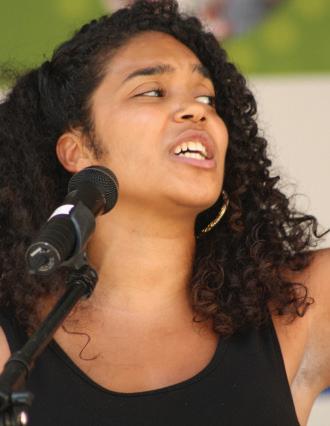
16 | @TownHallNYC
SOURCES
P.9 - YrsaDaley-Ward_picture by Andres De Lara
P.6 - Amanda_Gorman_2017_By Shawn Miller - https_blogs.loc.gov_loc_2021_01_amanda-gorman-selected-as-president-elect-joe-bidens-inaugural-poet_, Public Domain, https_commons.wikimedia.org_w_index.php_curid=99054096jpg
P.9 - AmiriBaraka_Carl Van Vechten, © Van Vechten Trust. Beinecke Rare Book and Manuscript Library, Yale University
P.11 - Aracelis_Girmay_slowking4, GFDL 1.2 _http_www.gnu.org_licenses_old-licenses_fdl-1.2.html_, via Wikimedia Commons
P.11 - Charlotte_Forten_Grimké_unknownauthor_publicdomain
P.10 - Claudia_Rankine_John Lucas, CC BY-SA 3.0 _https_creativecommons.org_licenses_by-sa_3.0_, via Wikimedia Commons
P.11 - ElivabethAcevedo_Elvert Barnes, CC BY-SA 2.0 _https_creativecommons.org_licenses_by-sa_2.0_, via Wikimedia Commons
P.8 - EveEwing_Image credit_ Nolis Anderson
P.11 - Georgia Douglas Johnson_Robert T. Kerlin, Public domain, via Wikimedia Commons
P.8 - Gregory_Pardlo_Larry D. Moore, CC BY-SA 4.0 _https_creativecommons.org_licenses_by-sa_4.0_, via Wikimedia Commons
P.6 - Gwendolyn_Brooks_By Kingkongphoto _amp_ www.celebrity-photos.com from Laurel Maryland, USA - Gwendolyn Brooks, CC BY-SA 2.0, https_commons.wikimedia.org_w_index.php_curid=74848074
P.9 - Jericho_brown_2014_Larry D. Moore, CC BY-SA 4.0 _https_creativecommons.org_licenses_by-sa_4.0_, via Wikimedia Commons
P.10 - JessieFauset_Robert T. Kerlin, Public domain, via Wikimedia Commons
P.9 - Jesús_Colón_Unknown author
P.7 - JuneJordan_Photo by Gwen Phillips
P.7 - Mahogany Browne
P.6 - Maya_Angelou_By York College ISLGP - https_www.flickr.com_photos_65767546@N08_8449738207_, CC BY 2.0, https_commons.wikimedia.org_w_index.php_curid=33057513
P.10 - Ntozake_Shange,_Reid_Lecture,_Women_Issues_Luncheon,_Women_s_Center,_November_1978_Crisco_edit_Barnard College_ digitally restored by Chris Woodrich, CC BY-SA 3.0 _https_creativecommons.org_licenses_by-sa_3.0_, via Wikimedia Commons
P.8 - Staceyann_Chin_by_David_Shankbone_David Shankbone, CC BY-SA 3.0 _http_creativecommons.org_licenses_by-sa_3.0_, via Wikimedia Commons
P.8 - Tracey K Smith_Rachel Eliza Griffiths. Courtesy of Blue Flower Arts
P.9 - TyehimbaJess_kutibeng, CC BY 2.0 _https_creativecommons.org_licenses_by_2.0_, via Wikimedia Commons
P.7 - Claude_McKay_1920_Unknown artistUnknown artist, Public domain, via Wikimedia Commons
P.10 - Frances_Ellen_Watkins_Harper_Engraved portrait of Frances Ellen Watkins Harper from The Underground Railroad by William Still. (Photo by Library of Congress_Corbis_VCG via Getty Images)
P.6 - Nikki_Giovanni_Kingkongphoto _ www.celebrity-photos.com from Laurel Maryland, USA, CC BY-SA 2.0 _https_creativecommons.org_licenses_by-sa_2.0_, via Wikimedia Commons
P.7 - Sonia_Sanchez_Kingkongphoto _ www.celebrity-photos.com from Laurel Maryland, USA, CC BY-SA 2.0 _https_creativecommons.org_licenses_by-sa_2.0_, via Wikimedia Commons
P.11 - AliceDunbarNelson_Robert T. Kerlin, Public domain, via Wikimedia Commons
P.6 - Portrait of Langston Hughes - Farm Security Administration - Office of War Information photograph collection (Library of Congress) - https://www.loc.gov/resource/fsa.8d39489/
@TownHallNYC | 17









